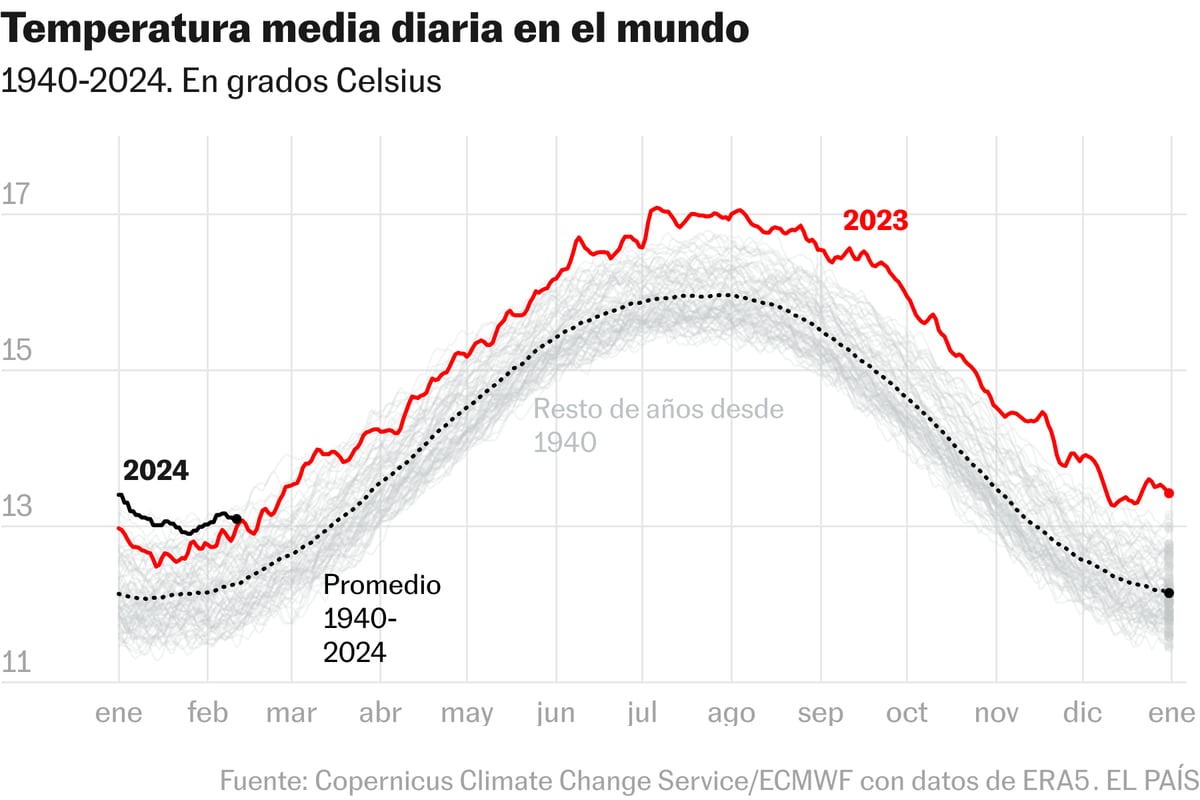We can look the other way and avoid taking measures against climate change and its main causes—fossil fuels—but this crisis will continue to be here, worsening and setting records.
2023 closed as the hottest year on Earth since records began in the mid-19th century (although paleoclimatic scientists maintain that we have to go back several millennia to find a planet this warm).
Last month it happened again: it was the warmest January ever recorded.
And there are now eight consecutive record months in which the same thing happens, according to information released this Thursday by the Copernicus Climate Change Service, dependent on the European Commission.
These are the data on the average temperatures on the planetary surface.
But if the focus is closed further, the portrait does not change much: in Spain as a whole, for example, this January has also been the warmest in the historical series of the State Meteorological Agency (Aemet), which in this case begins in 1961. “It was an extremely hot month,” explained on Wednesday the Ministry for the Ecological Transition and the Demographic Challenge, on which Aemet depends.
To find the reasons that are causing these warm temperatures, we must look directly at climate change.
Because without the warming of the planet caused by the greenhouse gases expelled by the world economy and that accumulate in the atmosphere, these records sustained over time would be practically impossible.
Neither this January nor 2023 are an exception, but rather they are part of a trend: the last nine years (2015-2023) are the warmest on record so far.
And science has established a direct relationship between this warming and greenhouse gases.
The main one is carbon dioxide (CO₂), whose concentration in the air has been growing steadily since the Industrial Revolution.
Scientists explain that to find an accumulation similar to the current one, you have to go back between 800,000 and two million years.
But to this background warming generated by humans are added other factors linked to the variability of the planetary climate, as it seems to be happening with the
El Niño
phenomenon .
In June of last year, this natural pattern began that causes water surface temperatures in tropical areas of the Pacific to increase, which ends up having effects on the global climate.
Copernicus now indicates that
El Niño
has begun to weaken in the equatorial Pacific, although “overall marine air temperatures remained at an unusually high level.”
In fact, they are at record levels as well.
According to Copernicus data, during the last days of January and the first days of February, historical sea temperature records in extrapolar zones have been exceeded.
“2024 begins with another record month: not only is it the warmest January on record, but we have also just experienced a 12-month period of more than 1.5 ° C above the pre-industrial reference period,” said Samantha Burgess, deputy director of the Copernicus Climate Change Service.
“Rapidly reducing greenhouse gas emissions is the only way to stop the rise in global temperatures,” she added in a statement.
The Paris Agreement, signed in 2015 and which governs global efforts against climate change, establishes as a general objective that the increase in global temperature with respect to the pre-industrial average (1850-1900) remains between 1.5 and two Celsius degrees.
The global average temperature of the last 12 months (from February 2023 to January 2024) has already been 1.52 degrees above that pre-industrial average.
This does not mean that the most ambitious goal of the Paris Agreement has already been breached; to do so, the 1.5 degree barrier should be stably overcome (for an average decade), something that is expected to happen from of the next decade.
Record also in Spain
January has also been a record month in Spain.
This is how the Ministry for the Ecological Transition explained it: “It has been extremely warm overall, with an average temperature over mainland Spain of 8.4 degrees Celsius, a value that is 2.4 degrees above the average for this month.” , taking as reference the period 1991-2020.
“It was the warmest January since the beginning of the series in 1961, having surpassed January 2016 by 0.4 degrees, which was until now the warmest in the series,” added this department.
Regarding precipitation, Aemet data indicates that this January has been a wet month in the country as a whole.
However, the rain has been very uneven.
While in the center of the peninsula and some areas of Aragon it has been very humid, it has been dry "in Catalonia, Murcia, areas of the Levant peninsula, Andalusia, the Cantabrian coast, Navarra and northern Galicia."
Which in some cases, such as Catalonia and several areas of Andalusia, further aggravates the drought situation that has been going on for months.
You can follow
Climate and Environment
on
and
X
, or sign up here to receive
our weekly newsletter
Subscribe to continue reading
Read without limits
Keep reading
I am already a subscriber
_

